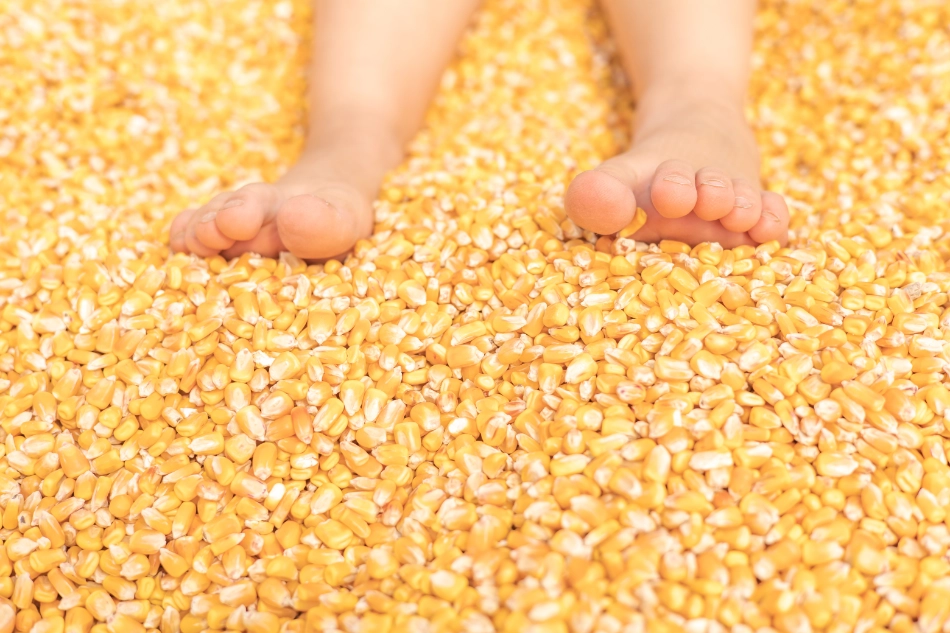Getting Rid of Those Pesky Corns on Your Feet… NO! Not That Corn🌽
Corns are a common foot condition that can cause discomfort and pain, making daily activities more challenging. If you’ve ever experienced a corn on your foot, you know how irritating they can be. But what exactly are corns, why should you remove them, and what are the best ways to treat them? At West Coast Podiatry Center, we specialize in foot health and offer a range of treatment options to help you get rid of corns and keep your feet in top shape.
What Are Corns?
Corns are thickened areas of skin that develop due to repeated friction or pressure, usually over bony areas of the feet, such as the tops or sides of the toes. They form as the skin’s natural defense mechanism to protect underlying tissues from excessive stress. Corns can be hard or soft:
- Hard corns typically develop on the tops and sides of the toes and are firm, dense, and painful.
- Soft corns usually form between the toes where moisture is present, making them softer but still uncomfortable.
Why Should You Get Rid of Corns?
While corns themselves are not dangerous, they can become painful and interfere with walking, exercise, and even wearing certain shoes. If left untreated, they may lead to complications such as infections or ulcers, especially for individuals with diabetes or circulation issues. Proper treatment helps relieve pain, prevent recurrence, and improve foot health.
Home Remedies for Corns
If your corns are mild and not causing severe discomfort, you may be able to treat them at home with these remedies:
- Soaking Your Feet – Soak your feet in warm, soapy water for about 10-15 minutes to soften the corns. This makes it easier to gently exfoliate the thickened skin.
- Exfoliating with a Pumice Stone – After soaking, use a pumice stone to carefully rub away the thickened skin. Avoid excessive scrubbing to prevent irritation.
- Moisturizing – Keeping your feet moisturized with a lotion or foot cream helps prevent excessive dryness, which can contribute to corns.
- Wearing Proper Footwear – Shoes that fit well and have enough toe room reduce friction and pressure on the feet, preventing corns from worsening or recurring.
- Using Toe Separators or Pads – Silicone toe separators and protective pads can help reduce friction and relieve pressure on corns.
Over-the-Counter Treatments
If home remedies are not enough, several over-the-counter (OTC) treatments can provide relief:
- Salicylic Acid Pads or Solutions – These products help soften and gradually remove the thickened skin of the corn. However, they should be used with caution, especially for individuals with diabetes or sensitive skin.
- Cushioning Pads – Non-medicated corn pads provide extra cushioning to reduce pressure and discomfort.
- Antibacterial Ointments – If a corn becomes irritated or develops a small wound, applying an antibacterial ointment can help prevent infection.
Clinical Treatments at West Coast Podiatry Center
If corns persist or cause significant pain, professional treatment may be necessary. At West Coast Podiatry Center, our experienced podiatrists offer several clinical solutions:
- Debridement (Corn Shaving) – Using specialized tools, we can safely remove the thickened skin without damaging the surrounding area. This provides immediate relief.
- Custom Orthotics – If foot structure or gait abnormalities contribute to recurrent corns, custom orthotics can help redistribute pressure and prevent future occurrences.
- Padding and Strapping – Our podiatrists can apply protective padding or strapping to alleviate pressure on affected areas and aid healing.
Advanced Treatment Options
For severe or recurring corns, advanced medical interventions may be necessary:
- Prescription Medications – Stronger topical treatments may be prescribed for stubborn corns.
- Surgical Correction – In cases where corns are caused by underlying structural issues, such as hammertoes or bone protrusions, corrective surgery may be recommended to address the root cause and prevent recurrence.
- Laser Therapy – Some patients may benefit from laser treatments that target thickened skin and promote healing.
Preventing Corns from Coming Back
Once your corns are treated, taking preventive steps can help keep them from returning:
- Choose well-fitting, supportive footwear with a wide toe box.
- Keep your feet moisturized to prevent excessive dryness and friction.
- Use protective padding or insoles if you are prone to corns.
- Regularly inspect your feet, especially if you have diabetes or other conditions affecting foot health.
Let West Coast Podiatry Center Help You
If you’re struggling with painful corns, West Coast Podiatry Center in Sarasota, Bradenton, and Venice, FL, is here to help. Our expert podiatrists provide comprehensive foot care solutions to keep you comfortable and mobile. Schedule an appointment today to find the best treatment option for you and take the first step toward healthier feet!
Contact us today to learn more or book your consultation!


